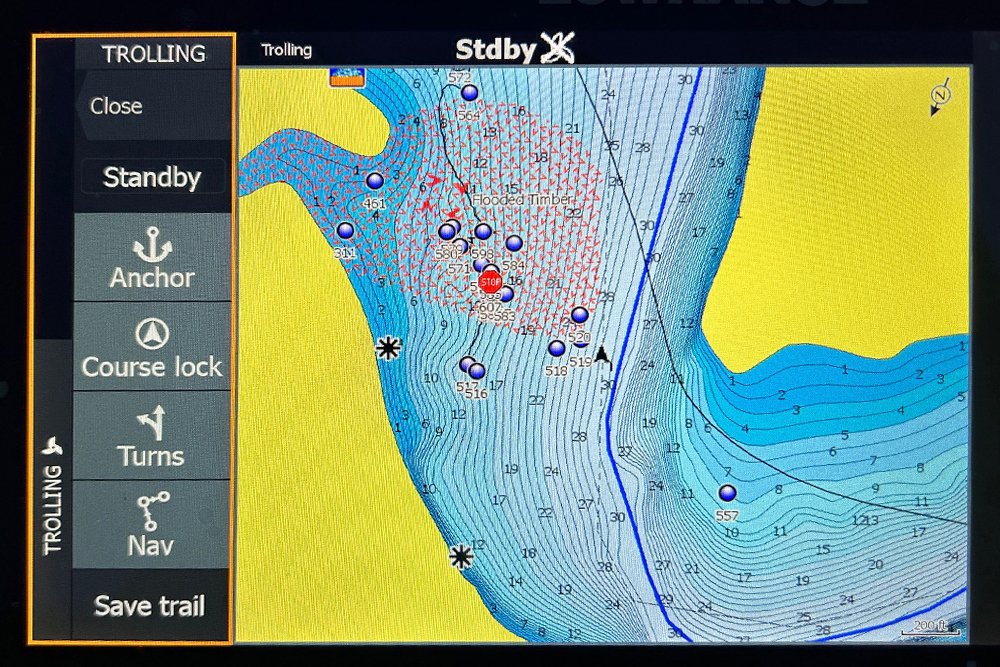Control tool bar allows an angler to select popular navigation modes. (Photo by Brad Wiegmann)
Wireless Integration for your Electronics
by Brad Wiegmann
Integration is a key word when talking about marine electronics. You can connect to one or more units in a boat and control multiple screens; in addition to a pilot mode that can control a trolling motor with compatible units. By integrating sonar/GPS units and trolling motor, an angler can control direction, speed, course and more.
Garmin, Lowrance and Minn Kota all have a feature similar to Lowrance’s trolling motor autopilot capable of controlling the trolling motor from the sonar/GPS unit. A control tool bar will appear once the sonar/GPS unit and trolling motor is interfaced. Normally only one unit can interface with the trolling motor at a time.
Once the autopilot mode is engaged, an angler can select from several different modes available. In anchor modes, the trolling motor spotlocks, maintaining the boat’s precise position. An angler can also have the autopilot navigate to a cursor position or waypoint, even changing the position in anchor mode and heading-lock mode.

Heading-lock mode is by far the most popular with anglers trolling in open water situations. Once its activated, heading lock mode will steer the trolling motor in the direction the compass is headed. If the heading needs to be changed an angler can press the port or starboard button in the heading of the direction they want to fish. Heading-lock mode is popular with anglers wanting to troll without having to direct the boat with the controls. Note that changing direction with the trolling motor foot control can turn off the heading-lock mode.
Other navigation mode options located in the autopilot controller are turning pattern steering options. Lowrance has turn variables, U-turn, C-turn, spiral, zigzag-turn, square and S-turn to select from when in autopilot mode. These navigation modes allow anglers the ability to make selected turns without having to control the boat during a turn or a number of turns.
When the trolling motor and sonar/GPS unit is in heading-lock mode, navigation mode and in turn, pattern steering the autopilot mode is able to control the speed in which the boat is traveling. Normally the boat speed is noted in MPH capable of maintaining that speed as long as the trolling motor and Sonar/GPS is on. MPH or propeller rate can control the target speed set by the angler. Anglers can record and save a trail to use right after making a trail in the autopilot mode.
Integration also allows anglers the ability to communicate between the sonar/GPS unit and trolling motor. Programmable trolling motor allows the angler to configure keys to control what a trolling motor is doing. The Lowrance Ghost trolling motor offers three programmable trolling motor keys. By stepping on the one key the trolling motor makes operating a boat easier.
Another option is the outboard autopilot. Not to be confused with the autopilot mode with the similar control bars, however, the power is being supplied by an outboard which is louder and creates waves or wakes that will spook fish.
(From Springdale, Arkansas, Brad Wiegmann is a professional photographer, videographer and outdoor writer published in dozens of print and electronic media outlets all across the nation. Every month Wiegmann will be providing CrappieNOW readers with the latest and greatest information on the ever-changing world of fishing electronics. He is also a well-known guide, podcaster and social media influencer. Learn more about Wiegmann and his lengthy experience and expertise at BradWiegmann.com.)


